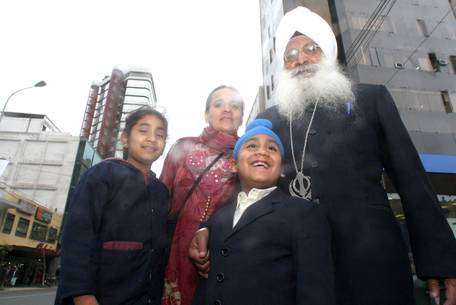Sikhs have faced persecution not only overseas but also in India itself.
Second Part
December 9, 2005
Partap Singh and Family Leave Peru to Begin a New Life In India
Cochin,
Kerala,
India –
After a 4-year lonely struggle fighting mistaken identity and ignorance and facing extreme difficulties, Partap Singh decided that enough was enough. After trying all possible honest means in providing for his family while not compromising Sikh principles, he turned to the Sikh community for help in September of 2005. He contacted UNITED SIKHS, which recognized his distressful situation and offered to come to his aid after thoroughly analyzing and verifying his circumstances.
Three months after the initial plea for assistance, Partap Singh and his family has been relocated to Cochin, Kerala, where he envisions that his multilingual talent and experience within the tourism industry will fulfill his worldly needs and where the sizeable Sikh community will fulfill his and his family’s spiritual needs.
Partap Singh and family said goodbye to Peru and arrived in Mumbai on November 17, 2005. Three vans and several Sikhs stood in anticipation at the airport to transport the whole family to the Singh Sabha Gurdwara in Dadar. It had been over a decade since he had visited a Gurdwara and been with a Sikh congregation. It was also the first time his Peruvian-born family had seen a Gurdwara. After a few days stay, they moved on to the Singh Sabha Gurdwara in Cochin, where local Sangat is currently looking after them until a residence is found.
“I will always remember the sewa UNITED SIKHS has done for me,” commented Partap Singh. “I was nervous and felt defeated but after being dejected after several pleas, suddenly UNITED SIKHS was there”. “I still remember the words of Kuldip Singh when he said, ‘Don’t worry, Partap Singh Ji, you are not alone. The whole Sikh Kaum (community) is standing behind you.’ Today I know that they made it possible for me, and the Kaum is truly standing behind me. As soon as I am capable, I will repay the Kaum several times back and dedicate my life to helping others in distress”, he added.
Partap Singh says that through his troubled times in Lima, Peru the only thing that kept him going was the thought of how Guru Gobind Singh spent his difficult days in the jungles of Macchiwada and how Guru Arjan stood the heat of a burning hot plate for five long days and nights without giving in to defeat. “Sikhism is so wonderful!” he exclaims. “It makes hardships go by without flinching and then the Guru does always take care of you eventually.” His family thanks everyone who provided support; physically, emotionally, financially and psychologically. He says that the Sikh community will always be in his prayers, until his very last breath.
With the help of donations from the Sikh community, UNITED SIKHS was able to pay Partap Singh’s expenses for three months before leaving Peru, for his wife’s abdominal surgery, their nine months of unpaid rent, take care of the family’s travel expenses to India, and settle the family in India including ample startup funds. Also, since the appeal went out, numerous people in the travel industry have contacted Partap Singh, providing him with many opportunities with his travel career.
UNITED SIKHS was overwhelmed by the caring response of the Sikh community since the original Community Appeal went out in late September. Sikhs from around the world opened their hearts. There were cash donations, frequent flier miles donations, personal visits, moral encouragement, pro bono offers to assist in US Asylum, and offers to help him stay in Peru by taking care of his living expenses for life. UNITED SIKHS would like to express our sincere gratitude to all those who donated whatever resources they could to aid Partap Singh and his family.





